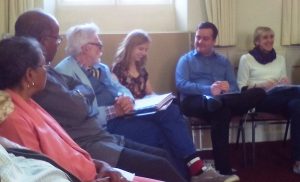I’m waiting at the bar in Sarum College with classicist and fellow Implicit Religion newbie Jessica Hughes. ‘When I get home my partner will ask what this conference was all about… I’m actually not quite sure what I’m going to say…’
And in truth it’s a conference that defies tidy definition, with eclecticism of methodology and content very much the modus operandi. It’s a small event (all the attendees sit together in large circle) yet one with a deep well of tradition (spanning some forty years). It’s a conference thematically inspired by a single scholar’s work (the late Edward Bailey) yet one that in just a couple of days intersects with sociology, theology, psychology, gender theory, memory studies, and knitting.
So what binds it all together? My own tentative answer is two-fold.
First, there is a recurring ambition to tease out what’s happening at the awkward edges of various phenomena we describe as ‘religious’ or ‘secular’. When is devotion to a practice or an idea to be understood as ‘religious’, and when is it not? What are the power-dynamics and contextual factors at play when we label something ‘religion’?
But the second element is a commitment to an unusual mode of conference organisation, specifically one in which participants are asked to circulate 5-8,000 word papers well in advance, and an expectation that, in person, each presenter then offer merely a few prompts for discussion. This is, in other words, a conference in which preparation and intellectual generosity are key. It’s also one where, at its best, formal hierarchy is put to one side, with input coming from final year undergraduates through to emeritus fellows.
 And most of the time it works. In what ways do fan cultures ritualise their devotion, and re-imagine their identities? How do women grieve, memorialise, and provide comfort through traditions of textile production? What is it to ‘feel’ the Christmas spirit? Why are so many people ticking ‘Christian’ on censuses while rarely turning up in churches? And (for my own paper) how is state-led Holocaust remembrance borrowing and reconfiguring manifestations of sacrality? These are just a few of the topics that came into view in what was a packed programme of less than 48 hours.
And most of the time it works. In what ways do fan cultures ritualise their devotion, and re-imagine their identities? How do women grieve, memorialise, and provide comfort through traditions of textile production? What is it to ‘feel’ the Christmas spirit? Why are so many people ticking ‘Christian’ on censuses while rarely turning up in churches? And (for my own paper) how is state-led Holocaust remembrance borrowing and reconfiguring manifestations of sacrality? These are just a few of the topics that came into view in what was a packed programme of less than 48 hours.
The emphasis is on working things through together, exploring unexpected connections, taking a few risks. The bumpy usually-productive/occasionally-frustrating outcome sits at the far side of the spectrum to the conferences of dress-codes and niche panels.
And at the end of it all I find myself, on the one hand, wary of saying we’ve further nailed down the exact parameters of religion vs. non-religion, yet on the other, no less convinced that there have been and will continue to be so many modes in which to experience the world.
If every conference was like Implicit Religion maybe I’d eventually feel like I was building with jelly. But without intellectual spaces like this the risk is of remaining hubristically oblivious to the brittle fragility of our categories.
David Tollerton
